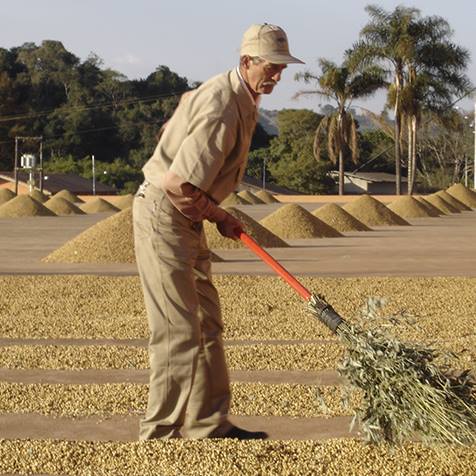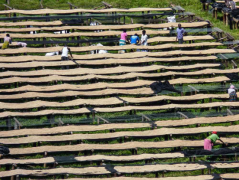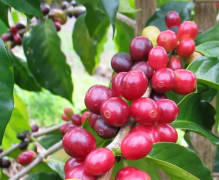Coffee cultivation quality in Tanzania Coffee Farmers' Economic Environment Coffee Export
Tanzania's main coffee producing area is located at the foot of Mount Kilimanjaro, which is rich in volcanic soil. Some of the coffee trees planted here are more than 100 years old. Coffee was first introduced by Christians from Kenya to grow coffee. Coffee trees must be carefully taken care of, weeded and fertilized.
Moreover, the old branches must be cut off so that new branches can grow again to maintain the quality of coffee beans. The processing factory is located in the nearby town at the foot of the mountain to facilitate the handling of coffee beans, and the equipment of the treatment plant is quite complete. Coffee beans are an important economic crop in Tanzania, and the local government attaches great importance to this industry. the families of farmers who run more farms have all lived here after generations of immigrants, but they are not necessarily local Africans. Farm owners include Indians, Nordic, British, of course, locals, but most of them are small farms, but most of the farms and processing farms are managed by local people. Workers earn their wages by harvesting the amount of coffee fruit. They often see women with children on their backs. In Africa, there are no nannies, and older children have to look after their younger siblings when they reach the age of 5-6. Small farm women would use their hand-made sacks to bring coffee fruits to the farm to collect money.
The coffee beans produced here are all exported from Kilimanjaro, but apart from Mount Kilimanjaro, there are several major coffee-producing areas throughout Tanzania. There are more small farms in other areas, and most small farms also have an area of several hundred mu. Some have their own washing equipment and bean drying farms, but the graded treatment is still through large-scale treatment plants. Tanzania has considerable historical experience in growing coffee, and even small farms can handle good quality coffee beans.
Robusta coffee is also grown in Tanzania, which was introduced and transplanted from Congo in the early days, mainly in Lake Victoria near the border with Uganda in the west of Tanzania, and mostly sold to Europe, but the coffee grown in Tanzania is mainly Arabica.
The economy of Tanzania is not prosperous, most of the people still rely on agriculture, and not a small number of people are engaged in the coffee industry. another major source of money depends on the tourism income brought by wild animals, the natural resources of the country. The Maasai people in Tanzania are naturally free to approach nature, because they are unwilling to accept the shackles of civilization and work, but can retain the most primitive customs of the nation. Even if many Maasai are educated, those who can speak a little English can find a good job. Interestingly, the vast majority of Maasai are born the best guards because they are unwilling to do service-oriented work. In many local restaurants, restaurants, companies have hired a Maasai as a guard, 24-hour guard three months only once a week to a month off, quite competent.
On coffee farms and processing farms, we can see many women working in coffee to support their families, hand-picking coffee grades, and chatting while they are working. The local people are contented by nature, and we only use a few candies to share. To build a friendship with everyone. Labor in Tanzania is cheap, so much of the work of pruning and maintaining coffee plantations in Tanzania depends on manual processing rather than machines. Coffee has grown but is still green, when the busy season has not yet arrived, the job of coffee workers is to manually check to pick the leaves of some sick or worms. Basically, coffee processing in Tanzania is highly dependent on labor, but it also brings job opportunities for locals and increases household income.

Important Notice :
前街咖啡 FrontStreet Coffee has moved to new addredd:
FrontStreet Coffee Address: 315,Donghua East Road,GuangZhou
Tel:020 38364473
- Prev

Introduction and description of Hambela Manor Coffee Flavor by Buku Able Viaduct Solar method
Buku Able elevated tanning-Hambela Manor Buku Able refers to cherry collection stations located in different areas of the farm. Hambela is located on the border between the Sidama and Guji areas in southern Ethiopia. In the past 20 years, regional boundaries have been redrawn several times, and the names of regions and communities have changed many times (due to non-standardized transliteration of local languages
- Next

Introduction to the flavor and taste of Chagg AA Coffee at Mosi Manor in Mount Kilimanjaro, Tanzania
Tanzania, which is adjacent to Kenya, produced coffee that was once famous for its extraordinary quality and unique taste, and was loved by coffee lovers. Later, under the influence of the national political situation, the coffee industry is declining day by day. In recent years, there is a warming trend, which still makes people look forward to it. Kilimanjaro is the highest mountain range in Africa, running through Tanzania
Related
- Does Rose Summer choose Blue, Green or Red? Detailed explanation of Rose Summer Coffee plots and Classification in Panamanian Jade Manor
- What is the difference between the origin, producing area, processing plant, cooperative and manor of coffee beans?
- How fine does the espresso powder fit? how to grind the espresso?
- Sca coffee roasting degree color card coffee roasting degree 8 roasting color values what do you mean?
- The practice of lattes: how to make lattes at home
- Introduction to Indonesian Fine Coffee beans-- Java Coffee producing area of Indonesian Arabica Coffee
- How much will the flavor of light and medium roasted rose summer be expressed? What baking level is rose summer suitable for?
- Introduction to the characteristics of washing, sun-drying or wet-planing coffee commonly used in Mantenin, Indonesia
- Price characteristics of Arabica Coffee Bean Starbucks introduction to Manning Coffee Bean Taste producing area Variety Manor
- What is the authentic Yega flavor? What are the flavor characteristics of the really excellent Yejasuffi coffee beans?

